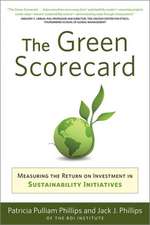Climate Policy after Copenhagen: The Role of Carbon Pricing
Autor Karsten Neuhoffen Limba Engleză Paperback – 15 iun 2011
| Toate formatele și edițiile | Preț | Express |
|---|---|---|
| Paperback (1) | 264.74 lei 6-8 săpt. | |
| Cambridge University Press – 15 iun 2011 | 264.74 lei 6-8 săpt. | |
| Hardback (1) | 700.29 lei 6-8 săpt. | |
| Cambridge University Press – 15 iun 2011 | 700.29 lei 6-8 săpt. |
Preț: 264.74 lei
Nou
Puncte Express: 397
Preț estimativ în valută:
50.66€ • 52.89$ • 41.93£
50.66€ • 52.89$ • 41.93£
Carte tipărită la comandă
Livrare economică 04-18 aprilie
Preluare comenzi: 021 569.72.76
Specificații
ISBN-13: 9781107401419
ISBN-10: 1107401410
Pagini: 296
Ilustrații: 47 b/w illus. 5 tables
Dimensiuni: 152 x 227 x 13 mm
Greutate: 0.48 kg
Editura: Cambridge University Press
Colecția Cambridge University Press
Locul publicării:New York, United States
ISBN-10: 1107401410
Pagini: 296
Ilustrații: 47 b/w illus. 5 tables
Dimensiuni: 152 x 227 x 13 mm
Greutate: 0.48 kg
Editura: Cambridge University Press
Colecția Cambridge University Press
Locul publicării:New York, United States
Cuprins
List of figures; List of tables; List of text boxes; 1. Introduction; 2. The role of a climate policy mix; 3. Implementing a carbon price, the example of cap and trade; 4. Shifting investment to low-carbon choices; 5. Co-operation among developed countries - a role for carbon markets?; 6. A world of different carbon prices; 7. International support for low-carbon growth in developing countries; 8. Conclusion; References; Index.
Recenzii
'Karsten Neuhoff makes an interesting case in showing that the failure to adopt a comprehensive climate agreement in Copenhagen may have been the result of some fundamental underlying changes. The Copenhagen Accord could therefore mark the beginning of a bottom-up approach in which domestic policy design based on carbon pricing as well as specific regulations can be supported through international co-operation. If his analysis proves right, the EU is in principle well equipped to such a change, but may have to rethink some elements of its international negotiation strategy accordingly.' Jos Delbeke, Director-General for Climate Action, European Commission
Notă biografică
Descriere
A timely analysis of carbon pricing that contains important lessons for anyone concerned with the development of post-Copenhagen climate policy.










